Photographs: Shabelle Media/Reuters
News of the government's proposal that free generic medicines be made available through the public health system can be read in two ways. On the one hand, it is a much-needed step forward – possibly a game-changing one – in improving affordability and accessibility in public health.
On the other hand, its efficacy will depend on whether simultaneous measures are taken to improve healthcare service delivery, which is in a shambles in most Indian states.
The Planning Commission's working group on drugs and food for the 12th Five-Year Plan estimated that the country's public health sector caters to only 22 per cent of the population.
...
The pros and cons of free generic drugs
Photographs: Mark Blinch/Reuters
Out-of-pocket expenses on health can have catastrophic effects on households. On an average, 78 per cent of health expenditure is paid by patients themselves, of which 72 per cent goes on buying drugs.
Unsurprisingly, therefore, about 30 per cent of India's rural population and 20 per cent of its urban population have to endure common ailments without, for financial reasons, any treatment.
Worse still, close to half of all hospitalisation cases in rural areas are financed through loans or the sale of assets.
...
The pros and cons of free generic drugs
Photographs: Rupak De Chowdhuri/Reuters
As a result, medical treatment has emerged as the second most common cause of rural indebtedness. Equally disquietingly, some 39 million people are pushed into poverty every year because of illness.
The new scheme, therefore, does seem capable – in theory– of addressing the dysfunctional economics of Indian healthcare.
The Union health ministry expects this programme to reach over 50 per cent of India's population by the end of the 12th Plan.
...
The pros and cons of free generic drugs
Photographs: Reuters
Should this happen, it would be a notable achievement. Indeed, in spite of the recent growth of India's private sector health network, public spending on health is insufficient to meet requirements.
The Centre and states together spend merely 1.1 per cent of gross domestic product (GDP) on public health; some indices rank India eighth last in the world on public health spending.
The Prime Minister's Office, unsurprisingly, directed the Planning Commission in February to increase healthcare provision to 2.5 per cent of GDP in the 12th Plan.
...
The pros and cons of free generic drugs
Photographs: Adrees Latif/Reuters
Like many other such ideas, the new scheme follows on from state-level initiatives in Rajasthan and Andhra Pradesh and is modelled on Tamil Nadu's successful free drugs programme, which has been in operation since 1995.
Tamil Nadu set up an autonomous corporation for the bulk procurement of generic drugs directly from manufacturers through a transparent bidding process, for allocation to primary health centres and hospitals -- through a demand-driven pass-book system rather than the normal supply-based distribution procedures.
Though corrupt practices have not been altogether eliminated by this system, they have reportedly been curbed to a large extent.
...
The pros and cons of free generic drugs
Photographs: Adrees Latif/Reuters
In expanding the programme nationwide, mechanisms to minimise leakages or recycling of publicly procured medicines must, of course, be adopted.
However, a vital prerequisite for the success of the free medicines programme is the strengthening of the existing healthcare system which has, over the years, tended to expand without consolidation. Most of the country's vast network of 640 district hospitals, 23,000 primary health centres and 5,000 community health centres is understaffed and ill-equipped.
And, of course, there's the question of funding: where will the Rs 27,000 crore (Rs 270 billion) to be spent on medicines come from? Is this the best time for a cash-strapped government to expand entitlements?

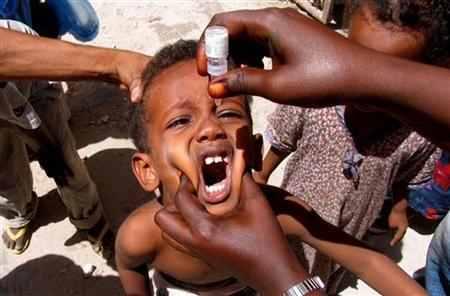
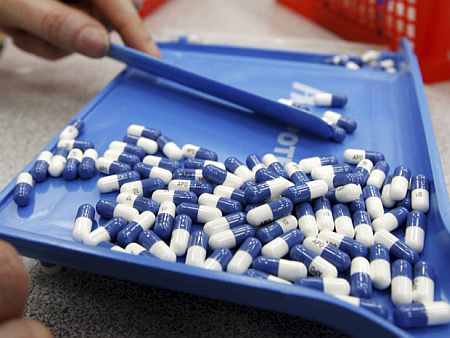

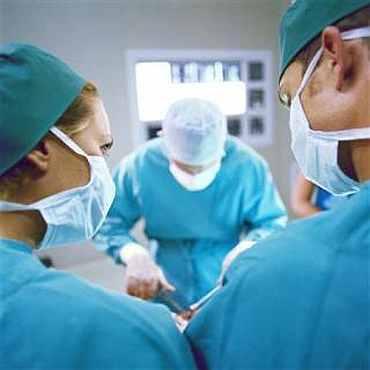
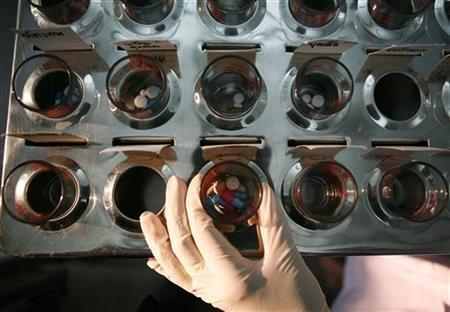
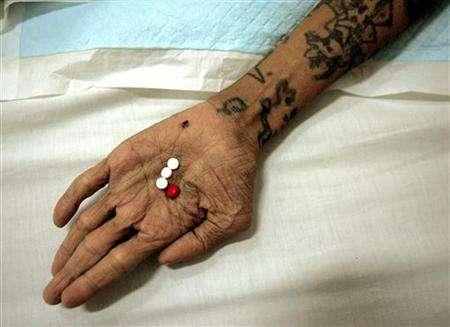

article